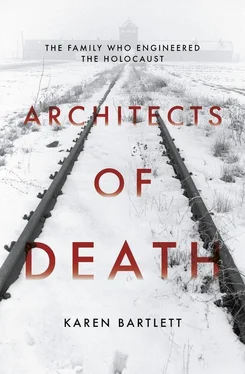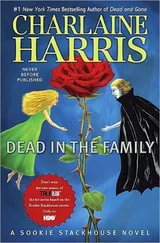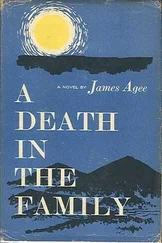Several years ago the city of Weimar commissioned us to repair one of its crematorium ovens. Our senior engineer, Prüfer, travelled to Weimar to look at it. A typhus epidemic [it was actually dysentery] had broken out in the Buchenwald concentration camp, and the number of deaths was rising by the day. At the time, the dead of Buchenwald were still being sent to the Weimar crematorium. The epidemic naturally made the transportation of the bodies problematic, and so it was decided to install a cremation oven right there in the camp – which was absolutely the right thing to do from a hygiene perspective. [110] Annegret Schüle, op. cit., pp. 240–243. Ludwig Topf’s explanation of the camps to the workers. AS footnote 10: Tuchel, Johannes: Die Inspektion der Konzentrationslager 1938–1945. Das System des Terrors [ Inspection of the Concentration Camps 1938–1945. The Terror System ], Edition Hentrich, 1994, p. 15. AS footnote 11: notes from the discussion, belonging to files. Works Council, 27.4.1945, ThHStAW, Collection Jean-Claude Pressac Nr 34, sheet 229f. Emphases in original.
The minutes of the meeting conclude that other contracts then followed from other camps, but that ‘all members of the works council were completely clear about this sequence of events and all agreed that we had nothing to worry about’.
In this meeting Ludwig Topf followed the tried and tested formula, developed by the Nazis, of describing the most atrocious acts in the blandest possible terms – and it seems that the works council was perfectly willing to collude with him on this point. In a works council resolution they stated that:
Neither of the Herr Topfs were Nazis… We have no complaints against the two gentlemen for the way they continued to run the business, and we are convinced that cooperating with them will be a good thing. Even in a communist-oriented economy, businessmen like these continue to have a place. [111] Ibid.
Annegret Schüle writes that, ‘Ludwig Topf took SS terror and extermination, and the Topf company’s own willingness to act as eager accomplices to them, and made them sound like a logical, virtually inevitable and utterly innocent sequence of events.’ [112] Ibid., p. 243.
Yet both brothers knew that what they’d done was far from innocent, and that the investigation into their activities was closing in.
When the Allied forces arrived in Erfurt they evicted Ludwig from his luxurious villa, which they used as a base for themselves. Ludwig moved next door into a smaller wooden house, still in the grounds of the Topf family park. It was here that American army officers found him on the evening of 30 May, and broke the news that Kurt Prüfer had been arrested earlier that day. Ludwig was told that he could expect to be picked up for questioning the following morning at 10 a.m. A calmer man might have taken this, perhaps, as a warning to escape, or a chance to prepare for the day ahead. But in the final months of the war the Topf brothers had not been calm. Just as they had spent the war years engaged in paranoid company squabbles, the strain of knowing that the tide had turned, irrevocably, against the Third Reich, drove Ernst Wolfgang, Ludwig and their sister, Hanna, into an emotional, bitter dispute with each other.
Rather than attempt to escape, Ludwig went to one of Erfurt’s oldest pharmacies, located on the corner of the cathedral square, and bought potassium cyanide. That night he used it to commit suicide. Before doing so he wrote a dramatic letter, steeped in self-pity, that captured his final thoughts:
If I have decided to avoid arrest, then it is for this reason: I no longer believe there is any justice in this world, after all the injustice and viciousness I have experienced at the hands of my family and everyone else. If I am arrested, gross injustice will befall me. I never did anything consciously and deliberately bad, but people have acted this way towards me. I was never cowardly – but I was proud. To put myself at the mercy of a foreign power is impossible for me, because I have learned the hard way that there is no longer any justice, any decency in this world. Therefore, as a decent man myself, I now have the opportunity to do with myself as I see fit. That means: to depart this world that has become generally unbearable and, that has persecuted me and been unjust to me in particular.
If I could believe that my innocence in the business with the crematoria – which is my brother’s innocence, too – would be acknowledged and respected, then I would go on fighting for my vindication, as I have hitherto. But it is my belief that the Volk wants its victims. And so I would prefer to take care of this matter myself. I was ever decent – the very opposite of a Nazi – the whole world knows that. If I could still feel peaceful in the bosom of my family, then the fight would be worthwhile – but the Topf family does not exist anymore, the Topf attitude, essence and self-respect are all gone. In these respects, I was always its lone representative. I am so alone that there isn’t even anyone I need to beg for forgiveness for my suicide.
In his new, and final, will, also composed that night, Ludwig explains why he has chosen to disinherit his siblings and make his lover Ursula Albrecht, company secretary Max Machemehl and the city of Erfurt his heirs: ‘My two siblings have grossly misunderstood and insulted me, and it took infinite goodness and brotherly love and strength of mind on my part to be able to deal with the appalling injustice I have suffered at the hands of my relatives.’ [113] Ibid., pp. 248–9. Ludwig Topf’s suicide note. AS footnote 35: Ludwig Topf, 30/31.5.1945, sheet 6 of transcript of files, ThHStAW, Collection Jean-Claude Pressac Nr 34, sheet 211.
It was true that the Topf family had long been riven with petty infighting, dysfunction and mistrust (in his penultimate will, written in April 1941, Ludwig refused Ernst Wolfgang’s pregnant wife, Erika, the right of residence in his home – and urged his brother to leave her). In the final year of the war, Ernst Wolfgang told company workers that the relationship between the two brothers had broken down to such an extent that Ernst Wolfgang stopped working in the office they shared in the administration building and withdrew from their joint partnership. From that point on, Ernst Wolfgang worked in a separate office some distance from Topf and Sons and acted as the company’s commercial director while Ludwig now sat opposite executive secretary Johanna Büschleb – who took Ernst Wolfgang’s side in the dispute, calling Ludwig short-tempered patronising and fault finding. ‘In the last fifteen months or so, something became apparent in my brother that went far beyond any earlier differences and arguments… namely, that he quite specifically couldn’t work with me any longer,’ Ernst Wolfgang told workers. ‘It is too much if two people fail over a small issue, if they simply cannot agree, then the company needs them to decide that one of the two will leave the company, but in such a way that the company is not convulsed as a result.’ [114] Ibid., p. 250. Ernst Wolfgang Topf’s explanation of Ludwig’s suicide to workers. AS footnote 41: Notes from the meeting, 8.6.1945, ThHStAW, J. A. Topf & Söhne Nr 427, sheets 75ff; Collection Jean-Claude Pressac Nr 34, sheets 232ff.
It appears that the brothers had fallen out over their limited-partnership agreement, with Ludwig wanting to disinherit his sister Hanna and her children. But Ernst Wolfgang’s account makes no mention of Ludwig’s fears of the ‘unjust retribution’ he feared he would face for Topf and Sons’ activities on behalf of the SS.
Of the two brothers Ludwig had taken the lead in developing the crematorium business for Topf and Sons, and when the Nazis came to power he had worked closely with his brother and Kurt Prüfer to ensure that every demand of the SS was met. He had involved himself in every intricate detail of the horrors of the Holocaust and the concentration camps, and for five years he had lived the blissful life of a playboy, all the while knowing that his technology was sending millions of terrified people to their deaths. Facing up to his actions would have required a maturity and composure that Ludwig did not possess, and choosing the coward’s way out was a final testament to his character.
Читать дальше












